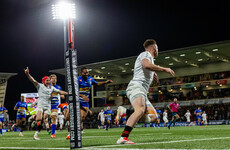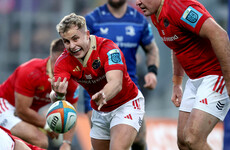“I HAVE SPREAD my dreams under your feet;
Tread softly because you tread on my dreams.”
It is quite fitting that David Conn’s new book, The Fall of the House of Fifa, opens with the famous WB Yeats line because the 300 pages that follow take us on a journey from the childhood innocence of believing you could be as good as Cruyff or Beckenbauer, to seeing the latter under criminal investigation in both Switzerland and Germany for his role in his country’s 2006 World Cup bid.
Like a lot of the characters you’ll come across in The Guardian journalist’s latest book, Beckenbauer denies any wrongdoing.
It’s a book that informs as much as it enrages, deliberately so says Conn as he was keen to root all that is wrong with football in what makes it the beautiful game in the first place.
“I didn’t want to write a book that was just ‘here are the guilty men, here are the documents, they’re the mafia,’” Conn told The42 this week.
“I’ve really tried to avoid that term. What I wanted to do, which is the same with all my writing about football, is communicate a love of the game throughout.
“First of all, because it’s true. I love football, I’ve always loved football and most of the people I’m writing for love football.
“So when you look at the betrayal of football, and that’s what this is on an industrial scale, it’s real villainy, it’s the betrayal of something wonderful.
“It’s not just unlawful and illegal. We feel it more than corruption in, say, the steel industry.
Sure, we’d be interested in that and find it illegal and wrong, but we don’t have absolute, precious, defining experiences of the steel industry from the time we were eight or nine years old.
“That’s why I decided to root [the book] in when I first fell in love with the World Cup and, therefore, football at the same time.
“Everyone remembers their first World Cup and while it might sound overblown to call that a transformative experience, I’d justify that by saying it suddenly opens out what was previously a private or intimate experience — of playing football in your own back yard or being taken to your first game at your local club — to this worldwide spectacle.
“Then, when you do get into the villains and the crooks and the deals, that love of football shines through and it’s that love that makes the betrayal so important.
“I hope that makes it more engaging and readable for people so, when they’re on page 150 and reading about someone they’ve never heard of taking a kick-back for a TV deal in South America, they’re still with you in the book.”
But before there were World Cup TV rights changing hands for hundreds of millions of euro, before football centres of excellence were being built for nearly $30 million in Trinidad [population of 1.3 million] and before Russia and Qatar were the surprise choices to host the 2018 and 2022 World Cup respectively; there was an election in 1974 that saw Joao Havelange begin his 24-year reign of Fifa.
The problem, as Conn clearly sets out in The Fall of the House of Fifa, both in relation to the larger than life Brazilian and his successor Sepp Blatter, is that the line between keeping an election promise and buying a vote is often blurred.
“I find it difficult to come to a definitive view on what the end goal was because you just can’t know what’s going on in other people’s hearts and minds,” says Conn.
People, like Blatter, like Mohammed bin Hammam, like Michel Platini and like Havelange, do have a mix of motives, it’s not necessarily just one thing.
“It’s like with [Chuck] Blazer. He’s one of the most interesting characters in Fifa and when it all came crashing down I said ‘now we know what he was up to all those years’.
“But when I first met him that time in Abu Dhabi, people told me: ‘he might look a bit ridiculous, but he works really hard and he loves football.’
“So I added that in the book, that it did appear to be true, because life isn’t simple. And those people in Fifa probably all felt like they were doing good, even when they were taking money.
“Most writing about this has always been really definitive that ‘oh they’re just slush funds used to buy votes’ but I just don’t agree with that. I don’t agree that it’s all just politics and I don’t agree that it’s all corrupt and the money goes to these FAs and doesn’t get spent on development.
“That’s blatantly not the case and there is a worldwide legacy of development, a concrete legacy. So I wanted to give due credit to that and, to do that, you have to give due credit to [development] as a motivation.
That said, the realpolitik is absolutely, 100%, there. It was also a system of patronage and, obviously, that’s a big reason for explaining why Blatter won five elections on the trot.
“He kept the money flowing to associations but that is not corruption.
“I put that to him directly and he said: ‘well if a politician says he’s going to build roads and hospitals and schools and then you elect him, and he builds roads and hospitals and schools, that’s not corruption.’”
“And he has a valid argument there.
“I mean, did [Gianni] Infantino believe that there should be greater development and there should be more of Fifa’s money spent on that development around the world? Probably yes. Why wouldn’t he? Any right-thinking person would.
“But did Infantino also know that was a massive political pitch he had to make to win the vote? And was he motivated by winning votes?
“Of course the answer is yes.
“So that’s what I’ve tried to do with the narrative and give more credit to Fifa’s motives and the genuine legacy than is generally acknowledged.”
What is clear reading the book is that Conn is yet to be convinced by the aforementioned Infantino and his promises to clean up an organisation that has seen seven members of the 22-man Fifa executive committee charged or accused by the US authorities of criminal wrongdoing, Beckenbauer — as we’ve seen — under criminal investigation and six further members sanctioned by the organisation’s own ethics committee.
For a start, as he outlines above, there are clear similarities between his path to the top of Fifa and his predecessors, but it’s more than that too. Since taking power, some of Infantino’s actions have left Conn scratching his head.
“To be honest, more has come to light since I wrote the book. I was in Bahrain three weeks ago when those two ethics commission chairmen [Cornel Borbely and Hans-Joachim Eckert] got removed.
“Infantino’s performance, talking about ‘fake news’ and ‘Fifa-bashing’ was really not encouraging.
“As I said earlier, there is realpolitik, there is winning votes in this literally worldwide collection of delegate FAs. That’s always going to be there. But Infantino really needs to show he’s a leader.
“He’s got a long way to go to prove that he is the reforming character than he pitched himself as.”
As you may have figured by now, Conn’s book is not a hatchet job on world football’s governing body. Instead it layers the evidence of one betrayal on top of another in, at times, rage-inducing detail.
And while Blatter is clearly the villain of the piece — the cover gives that away — the book ends with a story that, while not quite making you feel sorry for the 81-year old, reminds you that he, and everyone else in The Fall of the House of Fifa, is human.
Conn is interviewing Blatter for the book over dinner in Zurich and wants to pay, as per journalistic best practise.
Blatter refuses, saying:
No, no, not in my restaurant. Well, it’s not mine but I am still the boss here.”
Of course he’s not, but he still believes he is, still believes he was doing right by the sport he governed over for 18 years and that’s what makes his story, and that of bin Hammam, Platini, Warner, Blazer and everyone else associated with Fifa so compelling.
Life, even in a world of seven-star hotels, côte de boeuf and porcini, is lived in shades of grey, not black and white.
The Fall of the House of FIFA is published by Yellow Jersey Press and available from 8 June.
The42 is on Instagram! Tap the button below on your phone to follow us!














“If everyone was fit at the start of the Six Nations you definitely wouldn’t have picked that backline but Ford, Watson and Joseph have all been excellent. Ford controls the team so well and Joseph has been fantastic so far.”
This quote brings to mind the benefits of picking players in the position they play week in week out for their clubs.
Haskell is 3-1 to run head-long as fast as he can into one of the posts again. Free money!
The guys who are lighting up the 6 nations wouldn’t even get picked if they were full strength.
Strength in depth or a head coach who can’t pick his best 15 players?
Heaslip will be a huge loss against England. Jordi Murphy isn’t good enough for this kind of test. I think the best option is Henderson, O Mahoney and O Brien at 8.
O’Brien has only played 8 once for Ireland, I think you’d be more likely to see POM move to 8 then SOB – but it won’t happen. Joe likes his structures and it makes more sense from a squad perspective for one natural 8 to drop in and replace another.
It’s a pity though because I would love to see that backrow, Henderson is something else.
Is there anything to be said for bringing on Madigan for Payne after 60 mins for the Sextón, Madigan, Henshaw axis we all want to see? Payne has been great in defence but he’s not gelling with Sextón fast enough.
I dont want to see that trio against England.
Let me guess? Keatley, JJ and Earls would be your pick? ;)
Nothing to do with any alleged pro munster bias more to do with Madigans weakness in defense.Leave Payne at 12.
I don’t want to see that trio ever, I don’t want to see Madigan on an international pitch as I don’t think he’s anywhere near that standard of player so please speak for yourself.
@Fecky Din: Madigan is a good defender, he has proven that. That statement is simply made because you don’t like him, and/or he is a pretty boy. The stats don’t lie however. He is solid in defence.
@Stuart: The problem with that trio is that Henshaw is an unbelievable 12 and we have plenty of good 13′s. Payne, Earls, McFadden, Cave and Fitzgerald. Then there is the fact that 10 cover isn’t that great, with only Madigan and Keatley at the moment. Personally I’d pick Earls/Fitzgerald, but we can’t deny Payne has been doing a good job
Lovely reasoned comment and a beautiful name. We should all strive to be more like young Rudiger here!
Back to my point, I’m not saying Madigan should start. I think Payne is a less risky option. But when the game needs to be won in the last quarter you need to take a calculate risk at a game breaker. Payne hasn’t been as electric for Ireland compared to where he had loads of space at 15 in the Pro12. Granted neither has Madigan but we got a glimpse of his vision in the perfect pass to TOD against Italy who admittedly scored when he had no right to!
Why would I want to see 3arls playing in the Centre or why in Gods name would I have Keatley instead of an on fire Sexton? Are you insane? Straight in with the provincial cr@pology. Grow up, its Ireland.
Captain Craic!
As long as Earls isn’t playing 12 or 13 then it will be fine.
Payne doesn’t play 12 !!!!
Utter nonsense – you know absolutely nothing about rugby if you can’t see the obvious talent of Madigan – you may not like his personality but his talent is undeniable. Just a really silly comment
I never said he’d no talent. He is, however, pretty much untested at test level and as for throwing him in at 12 against England, why? Henshaw and Payne are rock solid defensively and with space will prosper in attack. Madigan isn’t as good defensively as either IMO. As for my knowledge on rugby, you may be right. I might know nothing. Madigans personality is not my affair or business, as an Ireland fan I do not want him at 12 V England.
I agree with Patrick! A lot is said for picking players who play week in week out in a position
Luke Fitz deserves his go at 13… That man of the match performance v Wasps showed how good he can be
Would ya stop. Biggest game of the tourno and throw in an untested player at a position he hasn’t held down since underage, madness.
“Untested” Lions test starter with a grand slam and 3 Heineken Cup medals in his pocket?
More experience at 13 than Payne!
Playing right into our hands if everyone keeps tipping the English. . Ireland better as the underdogs backs to the wall (hopefully)
England look OK – but only in the second half of the matches they have played so far.
Thoughts on Jordi Murphy??
Lovely hair
I can show you plenty of examples of his dynamism in attack. Have you got any examples of his weakness in defence? He’s the only way we are scoring trying against England. Luke and Earls are playing well too. We won’t beat England with penalties…
There is nothing to be said for it, the chap makes me nervous when he leaves the bench to warm up or even hand out water, his decision making is poor, his ability to control a game is poor, he came on as a blood replacement for sexton during the French game and twice he dragged our backline out of shape as he didn’t know whether he was playing 10 or 12
Nah…he was solid when he came on. Slotted his penalty with confidence. Worked a great wrapped around to get an attack goin on a penalty advantage and if Heaslip had off loaded the pass in the tackle back to him he’d have set the backs up for a score out wide. I think he’s been black listed cause of one shite wolfhounds night and that’s really unfair
This team is built around solid defence and unfortunately for earls because he is a great attacking player. He simply isn’t strong enough in defence to warrant a place in the squad.
And Jones…
To be honest Ireland are the form team. Lets not lose sight of that fact and making others favourites as usual.
Why is it that just before any championship whether its football or rugby or whatever, even though England doesn’t have good form, suddenly they can win it. Ireland are the form team and that is a fact.
You can’t deny that England look good for the tournament so far.
But I think Joe Schmidt is too smart a coach for anyone to be convinced.
I have faith for Sunday week and if we win – I’m predicting Ireland 16 England 11 – and then it’s ours to lose.
COYBIG!!!!!!!!!!!!